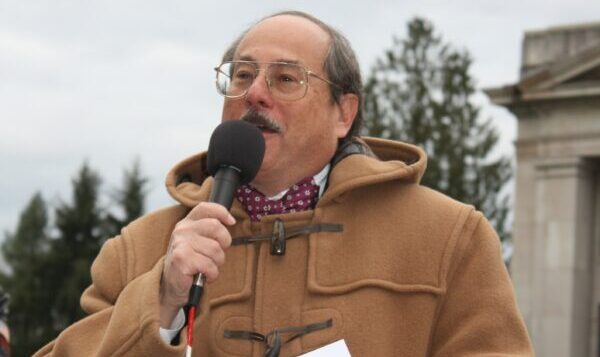
By Dave Workman
Editor-in-Chief
Last week was a good one for the Second Amendment Foundation, a gun rights non-profit based in Washington State but with a legal reach all the way to the U.S. Supreme Court, but founder Alan Gottlieb isn’t letting it go to his head.
Gottlieb, who serves as executive vice president of the organization, is smiling. SAF has been around more than 40 years, but hardly anyone outside of the firearms community heard of the group prior to the 2010 Supreme Court ruling in McDonald v. City of Chicago—which was a SAF case—because it focuses on legal action rather than political action.
But last week saw SAF bring in a pair of small-but-significant victories:
- In Tennessee, a state appeals court struck down a gun ban in a public housing unit in the city of Columbia. The case is known as Columbia Housing & Redevelopment Corp. v. Kinsley Braden. SAF supported Columbia resident Kinsley Braden in the case. He was represented by attorneys David G. Sigale of Wheaton, Ill., and Eugene R. Hallworth, of Columbia.
Writing for the three-judge appeals panel, Judge Frank G. Clement, Jr., explained, “(I)n light of the Supreme Court’s most recent decision in Bruen and keeping in mind the presumptively unconstitutional status of Columbia Housing’s policy based on the Supreme Court’s decision in Heller, we conclude that a total ban on the ability of law-abiding residents—like Mr. Braden—to possess a handgun within their public housing unit for the purpose of self-defense is unconstitutional under the Second Amendment.”
- In Buffalo, N.Y., it took a federal judge three days to grant a temporary restraining order in a SAF case challenging the state’s ban on concealed carry in churches—classified as “sensitive places” by lawmakers in Albany following the Supreme Court smackdown of New York’s century-old “good cause” requirement for obtaining a carry license.
The case is known as Hardaway v. Bruen, and the speed at which plaintiffs got their TRO is another signal the courts are not allowing New York politicians to end-run around the Supreme Court in its June 23 Second Amendment case of New York State Rifle & Pistol Association v. Bruen.
In the Tennessee case, Gottlieb noted in a statement “This underscores the far-reaching effect of the U.S. Supreme Court’s landmark Bruen opinion. Mr. Braden was evicted from the public housing complex because he had a firearm. The court properly held that such a prohibition is a non-starter. Rulings like this make it clear the Second Amendment means what it says.”
Judge Clement’s opinion boxed in the housing authority neatly.
“Because Columbia Housing is a government entity acting as a landlord of property it owns,” the judge wrote, “it must establish that its leasehold restrictions on firearms is ‘consistent with the Nation’s historical tradition of firearm regulation’.”
The lower court was reversed and the case was remanded for further proceedings consistent with the appeals court ruling.
Up in New York, Gottlieb observed, “We believe this law to be wholly in violation of not only the letter but the spirit of the Supreme Court’s decision in New York State Rifle & Pistol Association v. Bruen.”
Joining SAF in the Hardaway case is the Firearms Policy Coalition, Inc., on behalf of Bishop Larry A. Boyd of Buffalo and Rev. Dr. Jimmie Hardaway, Jr., of Niagara Falls.
“As we noted in our petition for the TRO,” Gottlieb observed, “Reverend Hardaway has almost always carried a firearm for self-defense on Sundays and at services on the premises of the churches he has pastored. New York has now stripped Reverend Hardaway, Bishop Boyd, and other New Yorkers of their ability to defend themselves should the need arise at their places of worship. The restrictive new statute prevented both men from doing so.”
Following the Supreme Court ruling, the Democrat-controlled New York Assembly scrambled to write a statute that would essentially skirt the high court. Many key tenets of the statute have already been declared unconstitutional by U.S. District Judge Glenn Suddaby earlier this month.
As noted in published reports, Judge Suddaby was notably harsh in his ruling.
“Simply stated,” he wrote, “instead of moving toward becoming a shall-issue jurisdiction, New York State has further entrenched itself as a shall-not-issue jurisdiction. And, by doing so, it has further reduced a first-class constitutional right to bear arms in public for self-defense … into a mere request.”
Gottlieb is encouraged by recent court actions in the aftermath of the June Bruen ruling, authored by Associate Justice Clarence Thomas. In recent years, SAF has filed dozens of court challenges to state and local gun control laws, primarily in federal courts but often in state courts. Illinois and California have been prime targets for litigation, and with the advent of the Bruen ruling this past summer, there appears to be no slowing down for Gottlieb and the various attorneys he’s been counting on to fight the battles.
He calls these wins “Another victory in our mission to win firearms freedom one lawsuit at a time.”



